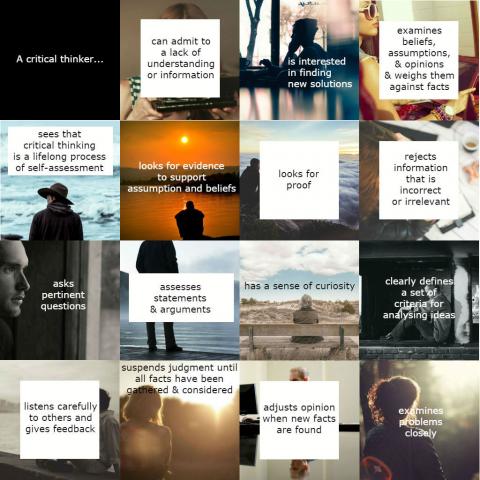Critical thinking is a skill that you are expected to develop as you progress through university. Critical thinking will become part of your research, your reading, your planning and reflection and of your academic writing. It involves a set of skills and an attitude of mind that you will need to cultivate and practise - it won't necessarily come easily or naturally! If you can develop critical thinking skills in relation to your subject, they will be valuable to you in many other aspects of life (including employment).

At university, knowledge is considered to be something that is open to change. It represents our best view at the time, but that view can change if we are presented with more convincing evidence. There are no permanent rights and wrongs, truths and falsehoods. Everything depends on context. One subject area may have a different way of constructing and writing about knowledge to another. Arts or Performance disciplines may have their own sets of languages and theories about evidence that emerges from practice, for example. It is important to be aware of these differences by noticing the way that knowledge is talked about and written about in your field.
Bloom's taxonomy of thinking and learning illustrates forms of thinking, in ascending order of complexity, from lower-order thinking skills (LOTS) to higher-order thinking skills (HOTS). It begins with remembering and ends with creating.
This is used by lecturers to set learning outcomes and assessment criteria for a course or module, you will often find these verbs in your module handbooks.
You can see that knowledge about a subject alone, like having access to a range of information, or ‘facts’, is at the simplest or lowest level. So using only, or mostly, descriptive language in your writing, to communicate what you know about a topic is not likely to generate many marks.
Higher and more complex levels include the ability to analyze, synthesise and evaluate information by comparing and contrasting different points of view, sets of information or experiences. This might involve recognising patterns of behaviour, for example, and using them to make predictions.
By engaging with your sources, and the evidence that emerges, you are demonstrating that you have done some deep learning. This is what your markers are looking for in your writing. To do this, it is essential to read a range of quality academic sources when researching.